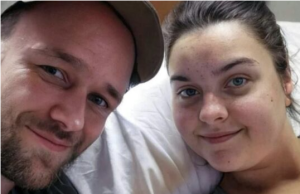Maria, a former singing and piano teacher in her final days at an Ohio care facility, longed for the music that once filled her life. Joshua Woodard, her former student and now a caregiver at the facility, was determined to grant her final wish. Maria’s wish was simple: to hear the song “How Great Thou Art” one last time.

Joshua, who had known Maria since he was just 9 years old, sang the heartfelt rendition of her favorite song with the lyrics on his phone. This touching moment was ddcaptured on film by Maria’s sister-in-law.
Maria’s story reminds us of the fear many have of growing old and losing their independence. As she faced the end of her life, music provided comfort and connection. In the words of Marti Adkins Redmond, “Hospice workers are angels, but this hospice aide is special.” Joshua’s act of kindness and the enduring bond between teacher and student exemplify the beauty of compassion in the face of mortality.
7 Tips When Someone You Love is Dying
1. Acknowledge the elephant in the room
The big “Ds,” death and dying, can seem awkward to talk about. Tiptoeing around death can actually add stress. If you don’t know where to start, just follow your loved one’s lead.
2. It’s okay to express your emotions, even your sadness, in front of your loved one
You may feel the urge to pretend that everything is all right, but expressing your feelings gives your loved one freedom to be honest about his or her feelings in front of you. Your loved one will likely feel relieved that you understand what’s occurring.
3. Your presence matters
Even if hospitals make you uncomfortable or you’d rather remember your loved one fully functional, showing up probably matters more than your loved one can say.
4. Create meaningful conversation
People at the end of life usually prefer to recall happy memories with those they love and find closure. Try to focus conversation around themes like forgiveness, gratitude and love between friends or family members and themselves.
5. Listen carefully for any messages trying to be conveyed
Sometimes, people approaching death may try to communicate an important message to those around them, even if they’re unable to speak clearly. If this happens, don’t immediately assume it’s nonsensical babble; do your best to understand what your loved one is trying to say.
6. Find out answers to typical end-of-life questions
If your loved one can still think rationally and communicate clearly with you, use this time to learn about your loved one’s end-of-life preferences. Knowing the answers to questions like “where do you hope to spend your last days?” and “what type of pain management do you want?” can help you ensure your loved one remains comfortable until the very end.
7. Be mindful of legal documents
Know what end-of-life legal decisions have already been made, such as a living will or a designated healthcare power of attorney. A living will describes wishes for medical treatment, including the use of life-prolonging treatment. A healthcare power of attorney is appointed to act on behalf of a person regarding medical treatment decisions. Knowing and respecting these decisions can help you carry out your loved one’s wishes with confidence.



















